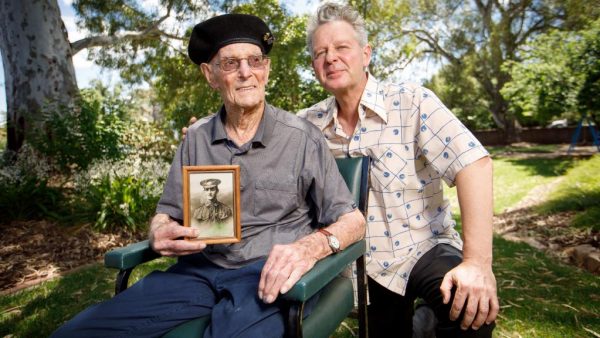| Wind Watch is a registered educational charity, founded in 2005. |
Diggers can rest in peace after Bullecourt wind farm plan scrapped
Credit: The Australian, November 20, 2017, Sam Buckingham-Jones, theaustralian.com.au ~~
The remains of thousands of Diggers who died in the brutal World War I battle of Bullecourt in France will remain at rest after plans to build a giant wind farm at the historic site were abandoned following a campaign from the soldiers’ families.

‘I couldn’t be more relieved’ … Ashley Starkey with his grandfather Valentine, aged 98, on Monday. Picture: James Elsby
The company that wanted to install six giant turbines at Bullecourt in northern France, where Australia suffered 10,000 casualties, now says the battleground should “remain undisturbed” more than two years after it first put forward the idea.
The turbines were to be installed by French power firm ENGIE Group at the scene of bloody battles in April and May of 1917.
“I couldn’t be more relieved,” Ashley Starkey, whose great-great-uncle Valentine Montgomery Starkey fell at Bullecourt. “It’s heartwarming to think a small group of Australians and French locals could get such a momentous change in two weeks since we started a small campaign.”
In a letter obtained by The Australian from ENGIE’s Australia and New Zealand chief executive, Michel Gantois, to Veterans’ Affairs Minister Dan Tehan, Mr Gantois confirmed the project would “not proceed”.
“On behalf of the ENGIE Group, I am very pleased to inform you that this development will now not proceed,” he wrote. “ENGIE Green listened carefully and respectfully to the arguments put forward and has decided that this ground should remain undisturbed, to be a place of reflection and commemoration for generations to come.”
Mr Tehan personally spoke to French officials, including his counterpart in France, Genevieve Darrieussecq, the secretary of state to the French Minister for Armed Forces, and the French ambassador to Australia, Christophe Penot, to express his strong opposition to the project.
Today, Mr Tehan thanked ENGIE Group for its decision.
“Seeing how passionate Australians were about protecting the final resting place of the Bullecourt soldiers was a powerful reminder that we will never forget the service and sacrifice of the men and women who fight for our freedom and values,” he said.
“This is wonderful news for every Australian and especially those with a family connection to the Battle of Bullecourt. Some 2300 Australians who died at Bullecourt have no known grave and Australians were rightly concerned about the potential impact of a construction project at the site.”
War historian CEW Bean described Bullecourt as a pivotal debacle that caused Australians to demand they control their soldiers rather than being subject to British command.
It was to be the first time an Australian infantry attack used the protection of tanks, but they were ineffective and, because the attack was supposed to be a surprise, there was no covering artillery bombardment. It has been estimated the remains of between 3000 and 4000 Australian, British and German soldiers were never recovered.
The wind turbine project had been in the pipeline for more than 2½ years. The company behind the initial plans, Maia Eolis, said it sent a letter in February 2015 to Stephen Brady, the Australian ambassador to France, asking to meet and discuss the project.
The letter was either lost, forgotten, or did not arrive, as Mr Tehan first heard about it in the past few months. ENGIE acquired Maia Eolis in March last year. The campaign was instigated by former Queensland premier Campbell Newman, whose great-uncle, Second Lieutenant Leslie Mullett, was killed in action. “He was listed as missing in action but they never found him,” he said earlier this month. “There were descriptions later of horrific scenes of bodies hanging up on the barbed wire.” Mr Newman described the plans as “the same as someone carving a trench through the Lone Pine cemetery and putting up a wind farm”.
Fighting in the 14th Battalion alongside Mullett was Albert Jacka, the first Australian to receive the Victoria Cross in World War I, for his actions at Gallipoli. Jacka was later decorated twice for bravery on the Western Front.
Ashley Starkey, a documentary-maker, discovered his family’s connection to the area when he was first showing the internet to his grandfather, who was named Valentine after his uncle.
The 98-year-old’s first thoughts were to Google his namesake.
“I only found out he was killed in this battle two weeks before I went to France,” Starkey said. “It took 100 years for our family to find out what happened to him, and to have had the site destroyed would have been very distressing.”
Australian War Memorial director Brendan Nelson criticised ENGIE for pursuing the project this far. “My strong advice to ENGIE’s executives is to desist from its insensitivity to those who gave their lives for the freedom of France,” he said.
This article is the work of the source indicated. Any opinions expressed in it are not necessarily those of National Wind Watch.
The copyright of this article resides with the author or publisher indicated. As part of its noncommercial educational effort to present the environmental, social, scientific, and economic issues of large-scale wind power development to a global audience seeking such information, National Wind Watch endeavors to observe “fair use” as provided for in section 107 of U.S. Copyright Law and similar “fair dealing” provisions of the copyright laws of other nations. Send requests to excerpt, general inquiries, and comments via e-mail.
| Wind Watch relies entirely on User Contributions |
 (via Stripe) |
 (via Paypal) |
Share:
| Tag: Victories |


